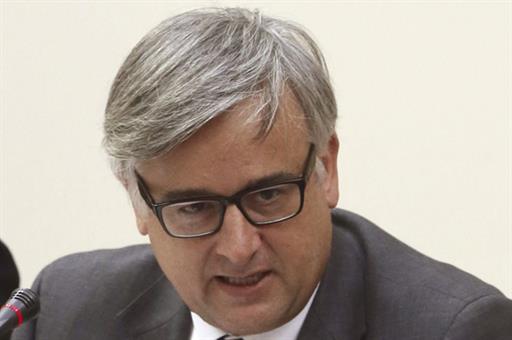State Secretary for Foreign Affairs takes part in bilateral Spain-Russia consultations
News - 2016.2.9
As well as meetings with Deputy Ministers Alexei Meshkov and Gennady Gatilov, Ignacio Ybáñez held meetings with the First Deputy Minister for Russian Foreign Affairs, Vladimir Titov, Chairman of the State Duma Committee on Foreign Affairs, Alexei Pushkov, and Chairman of the Russian Federation Council International Affairs Committee, Konstantín Kosachyov.
State Secretary Ybáñez and Deputy Minister Meshkov reviewed the healthy state of bilateral relations between the two countries and pointed to the importance of periodically holding high-level meetings. In this regard, they expressed their interest in Minister Lavrov visiting Madrid.
Ignacio Ybáñez and Alexei Meshkov welcomed the successful joint organisation of the Dual Language and Literature Year in a field in which relations are excellent (the Cervantes Institute in Moscow has the largest number of students in the entire network - some 5,000 - and an estimated 200,000 Russians speak Spanish), which will now move on to the Dual Tourism Year (2016-2017). It is expected that this will generate a dynamic that is favourable to the recovery of the sizeable Russian market in the Spanish tourist sector. They agreed on the need to harness synergies between the two economies, which are complementary, and to boost the volume of trade and investment relations that currently exist. Ignacio Ybáñez conveyed his concern over the situation of certain Spanish companies in Russia. The State secretary also took the opportunity of his stay in Moscow to hold a meeting with Spanish business leaders representing various sectors.
In relation to the crisis in Ukraine, the State secretary reiterated Spain's position in favour of a political solution to the conflict, based on compliance with the Minsk Accords and full respect for international law and the sovereignty, independence and territorial integrity of Ukraine. As regards relations between the European Union and Russia, our country defends a balanced and constructive approach, both as neighbours and as strategic partners, which is based on dialogue and allows for open discussion on the main international issues that concern and are of interest to both parties. To this end, they agreed on the importance of revamping relations between the EU and Russia. The State secretary also underlined the need to make decisive progress on human rights issues.
At the meeting held with Gennady Gatilov, the Deputy Minister for Foreign Affairs including those related to the UN, the State Secretary for Foreign Affairs explained Spain's priorities on the Security Council for 2016, particularly in regard to Women, Peace and Security; the working methods of the Security Council, including their reform and the process for selecting the next Secretary-General; and the fight against terrorism. On this point, Ignacio Ybáñez pointed out that Spain will work towards adopting a presidential declaration on the role of victims as a continuation of the informal session held in October 2015, which was co-organised by Spain and the United States, and it will continue to push through the initiative to set up an International Counter-Terrorism Court to ensure that these crimes against humanity do not go unpunished. Particularly important during this time will be the responsibility conferred on Spain by the other members of the Security Council to exercise the role of 'Facilitator' of the mechanism to verify compliance with Resolution 2231 on the Iranian nuclear programme.
Among other issues, Ignacio Ybáñez and Gennady Gatilov tackled the global review process under Resolution 1540 on the non-proliferation of weapons of mass destruction, which could culminate with a new resolution at the end of the year to coincide with the Spanish Presidency. Furthermore, the State secretary and the Russian deputy minister tackled some of the main issues on the agenda of the Security Council, such as the recent challenges to international law by North Korea and the need to adopt a resolution, which they both agreed upon; the crisis in Syria, both in its humanitarian dimension (Spain is the penholder of the Syria humanitarian dossier), and its political dimension, particularly as regards the importance of the Syrian opposition being represented at the peace talks in order to find a solution to the conflict; the situation in Libya, where they shared similar points of view and agreed on the concern at the delays in progress on the formation of the Government of National Accord; and the Middle East Peace Process, the war in Yemen, and the conflicts in the Sahel and certain sub-Saharan countries.





